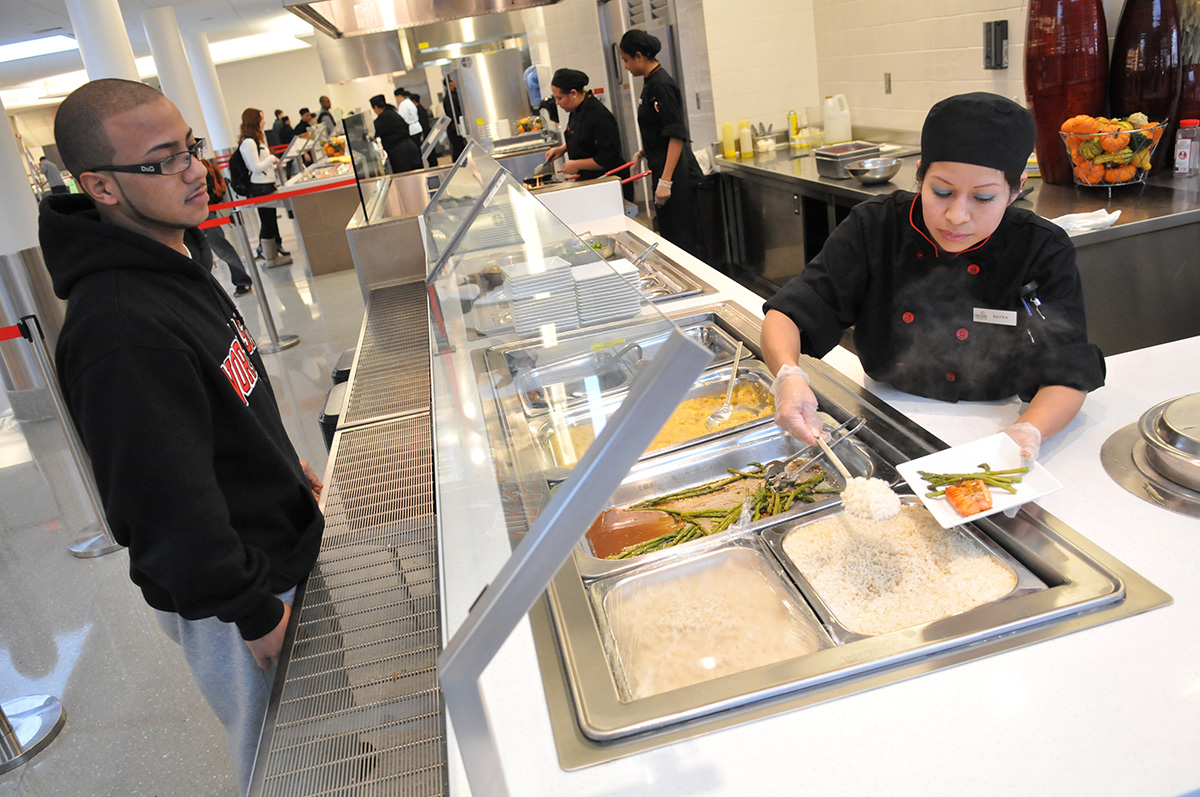12 Expert-Approved Health Tips for College Students

Northeastern University’s International Village/Photo provided
The streets are once again clogged with U-Hauls, minivans, and moving trucks, and that can mean only one thing: The students are back.
If you’re one of the roughly 150,000 college students who will call Boston home this year, welcome. You’re weeks, days, or hours away from embarking on another school year full of memories and challenges—not least among them staying healthy in an environment ruled by dining hall spreads, late night pizzas, and red cups. That’s no easy feat, so we called in an expert to help you.
Here, Julie Starr, a nutrition coach and fitness instructor, gives us 12 tips for surviving college, the healthy way.
Nutrition
1. Be a visual learner. If you’re not sure what’s good for you, choose foods that look as similar to their natural forms as possible. Stay away from offerings disguised by creamy sauces, heaps of butter, and deep-fried exteriors. “We all know what chicken looks like. Go with chicken that looks like chicken,” Starr says. “Your vegetables should look like the color of your vegetables. It takes different types of sauces to make something a different color.”
2. Don’t go back for seconds. How are you supposed to stop at one tray when unlimited cookies, cereals, and pizzas await? It takes time. “Give yourself 10 minutes after you’ve finished eating to truly see if you are still hungry,” Starr suggests. “It takes about 15 minutes for your body to even recognize that you have food in your belly.” It can also help, she says, to take a second and consider how good that dining hall cookie really is. Yeah, we thought so.
3. Vocalize your goals. “Say to [your friends], ‘This year, I’m not getting up to get those seconds,'” Starr recommends. It’ll hold you accountable, and it may even set a precedent for your friend group.
4. Customize. Deconstruct prepared dishes to get the healthy parts. Jazz up your salad by adding nuts, seeds, meat, or dried fruit. Use hot sauce and spices to make dishes less bland. In short: Make your food satisfying, and you won’t need to binge on fries and soft serve.
5. Keep your fridge stocked. Starr recommends buying yogurt, oatmeal, nut butter, single-serving frozen vegetables, and eggs—they can be cooked in the microwave, FYI—for your dorm fridge.
6. Be realistic. “You want to make the better decision,” Starr stresses. “It may not be the best decision—that option may not exist in your situation. But there will always be a decision that is better for you.”
Fitness
7. Something is better than nothing. “Just because you don’t have 60 minutes, it doesn’t mean that your 20 minutes isn’t worth it,” Starr says. Do a quick workout in your room, stop by the gym between classes, or go for a short walk or run.
8. Think beyond the gym. Treadmills and free weights aren’t the only ways to get a workout. Explore the city on foot, rent a Hubway bike, or join an intramural sports team. “As long as you commit to being active and walking, you’ll do just fine,” Starr says.
9. Find a workout buddy. Choose a fit-minded friend, and decide when you’ll hit the gym together. This’ll make the hardest part—actually getting there—a little easier.
Social Life
10. Stay hydrated. If you’re going to drink, Starr says, make sure to stay hydrated. Alternate alcoholic drinks with water.
11. Prepare for drunchies. Yes, this is an expert-approved tip. If you’re a drinker, Starr says stocking healthy-ish snacks may save you from the notorious 2 a.m. slice. “If you’re already that drunk, I’m not going to tell you to eat a salad,” she says. “Simple things like popcorn, or even pretzels, things that are in a single-serving bag, that’s better than ordering pizza.”
12. Mix up your social life. It’s easy for your calendar to revolve around parties and dining out, but resist the temptation. Go to free fitness classes, take yoga, go shopping, check out a new neighborhood—whatever appeals to you. “It is just about finding [other things to do] and committing to them,” she says. “You are as healthy as the group you hang out with, and you influence each other.”


